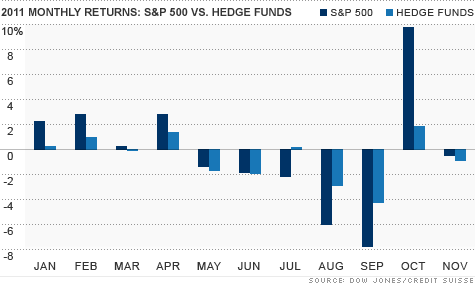
Hedge funds overall have underperformed the S&P 500 for 2011.
NEW YORK (CNNMoney) -- Hedge funds have done a poor job living up to their name in 2011, but they still managed to rake in the big bucks.
Rather than protect their investors against the market's losses, these funds have actually performed worse than the broader equity indexes.
An investor who put money into the S&P 500 (SPX) at the start of the year would have lost just 0.8% as of Nov. 30. That same investor would have lost 7% if the money was in an actively managed hedge fund with highly compensated advisors, according to the Dow Jones/Credit Suisse Core Hedge Fund Index.
Despite the industry's subpar performance this year, investors continue to add to these funds. Overall a net $8.6 billion flowed into hedge funds by the end of September, according to the Hedge Fund Research Institute.
Why would investors put money into an asset class that charges significantly higher fees (roughly 2% on money managed and 20% on any profits) than all others, which generally charge about 1%? Ask the underfunded pensions.
"Today, boards have this serious pressure to increase their returns," said Yuliya Oryol, a partner and head of the public pension practice at San Francisco, Calif., law firm Nossaman. And hedge funds, while riskier than other investments, offer the promise of market-beating returns, even if they prove to be elusive.
Boards often think they have no other choice because of those returns, said Oryol.
Take John Paulson's hedge funds. The Paulson Advantage LP is down 32% from the start of the year through Sept. 30. But for those who invested in this fund in 2007, it generated returns of nearly 100%.
Public pensions are facing huge gaps between what they've set aside to pay for employees retirement and what they've promised. In 2009, the gap for state and local public pensions was $1.26 trillion, yes trillion, according to the Pew Center of the States.
Low yields on Treasuries, which generally account for 25% to 30% of a pension portfolio, have exacerbated pressure for pensions, which generally forecast annual returns of 7% to 8% to stay current with funding.
According to data from the Federal Reserve, state and local public pensions held $3 trillion in assets, so even a small uptick in their allocation to hedge funds moves the needle for the overall industry.
"Hedge funds offer instant gratification to pensions because they can make the decision and get fully invested in the next month," said Stephen Nesbitt, CEO of Cliffwater, an investment consultant to pensions and endowments.
But investors can just as quickly get burned if those bets don't pay off.
Some of Paulson's funds are down nearly 50%, after he made faulty bets on companies like Bank of America (BAC, Fortune 500) and Chinese forestry company Sino-Forest (SNOFF).
Such staggering losses forced Paulson to turn his third-quarter letter to investors into an apology. "Year to date performance was the worst in the company's 17-year history. We are disappointed and apologize for those results," said the letter, which was obtained by CNNMoney.
Still, fewer than 8% Paulson's investors say they plan to remove their money from the roughly $28 billion under management by year end. A spokesperson for Paulson & Co. declined to comment.
Pensions are still drawn to the promise of stellar returns, which may be what's keeping Paulson's investors in his fund. In his third-quarter letter, he estimates 934% returns for the life of one of his funds, which has been operational since 1994.
Pensions have been increasing their allotment to hedge funds by a few percentage points over the past year, according to Nesbitt.
Unlike private equity funds and real estate investment trusts which have five to 10 year lockup of funds, investors in hedge funds can also remove funds on a quarterly basis.
Oryol said her clients, which include the California State Teachers' Retirement System and the Los Angeles City Employees Retirement System, are using that flexibility to leave underperforming hedge funds and move the same amount or more into other hedge funds.
For hedge funds like Paulson's, it appears that a mea culpa might be enough for now to keep investors' money. �![]()
First Published: December 5, 2011: 3:57 PM ET
Source: http://rss.cnn.com/~r/rss/money_topstories/~3/nA7sSltSvNw/index.htm
business business news news latest news us news key news best news economic news finance news economic news
No comments:
Post a Comment